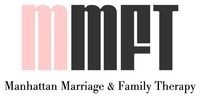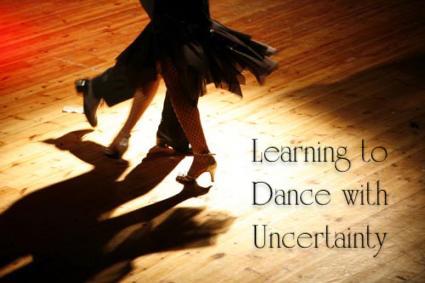Embracing Uncertainty
I recall for my very first session I read-up on theories, had questions prepared, and anticipated possible responses. In other words, I had a general idea of how I would like the session to unfold. However, my vision quickly took a back seat as the family took over by telling me all the problems they had with each other. Thus, I quickly learned that I was not the sole author of the therapeutic experience; there are multiple authors. Anderson (2008) explains that “conversations are a spontaneous activity in which client and practitioner together create the paths and determine the destination” (p. 18). In other words, while I, the therapist, may have some possible questions prepared, there is no certainty that those questions will be asked or answered during a session. Most often, new and alternative questions will emerge during the conversations. For example, with my senior clients, therapy is not about solving a problem per se, but rather a space for reflection on the life they have lived and the experience they hope for themselves now and after this life. Therefore, most of my questions generate from listening to their stories as they tell them. The journey varies as we move around from family stories to views on religions and society. As Anderson (2008) describes, “what the path looks like, the detours along the way, and the final destination will vary from client to client, from practitioner to practitioner, and from situation to situation” (p. 18). In other words, therapists and clients are co-creators of the therapeutic journey. As a result, every session (if not entirely) is slightly unique. Reasonable Hope Anderson (2008) further explains that “trusting uncertainty involves taking a risk, living with the sometimes associated tension, and being open to unforeseen change” (p. 19). For me, trusting uncertainty on this journey was not an easy endeavor. Because worry tends to act on me more often than I would like, I tend to seek out preparation and anticipation to assist me through times of uncertainties. However, I find that the practice of reasonable hope makes it possible for me to trust uncertainty. As with conversations, reasonable hope “flourishes in relationship” (Weingarten, 2010, p. 8). Because it is relational, “no one gives or provides hope to another, but rather one creates the conversational space for hope to arise from the forms of conversation one shares” (Weingarten, 2010, p. 11). More significantly, reasonable hope is not unrealistic expectations and unattainable goals, which can lead to disappointments, both on the part of the client and therapist. Instead, “Reasonable hope is a humble hope. It allows reasonable goals to triumph ideal ones. It is satisfied to do less than everything that needs to be done in order to ensure that something be done” (Weingarten, 2010, p. 10). By employing reasonable hope, I am able to sit more comfortably with not knowing how the conversations (as well as situations) will unfold with clients and to know that, while I am not a “miracle worker,” I am providing some help and care to my clients. An On-Going Process of Reflexivity Over the course of these several years, I learned many important skills (steps and moves, if you will) to help me become, hopefully, a good therapist. However, an important skill I have improved upon is developing awareness and becoming attune to my epistemology, how I know what I know, or how I think about my thinking. Dickerson (2010) describes this reflective process as an “invitation to position ourselves in a way of thinking so that the practices we employ and the theories we follow are consistent and congruent” (p. 350). It is about being “thoughtful and intentional” for how we conceptualize and approach a case. I do find that with my cases, I tend to think about the different contexts that influence a person’s experiences and relationships, but I am also curious about how a person is able to resolve those different (and sometimes competing) influences to live his or her preferred life. While there is no certain way to approach couples and family therapy, support and discussions from supervision and consultations were also invaluable to my growth as a therapist. It is within these type of conversations and reflections about challenging cases that I feel supported and reminded of reasonable hope. Those conversations also continue nurture my capacity to be creative and to dance with uncertainty, as I am able to take what I learn and apply it during sessions. Through this on-going process of reflexivity, my attention to my epistemology and social locations widened and I continue evolve as a therapist. I learned many things on my journey to become a therapist. While there will be days of wanting to hide under the bedcovers, there will be days when you feel like you are making a difference in a person’s life and helping to improve relationships. Preparation and anticipation are good dancing partners when they allow for flexibility and spontaneity. Being a therapist is about embracing and engaging life’s uncertainties. However, unlike just learning something new, learning to dance with uncertainty is an on-going process, because it involves relationships and the daring act of believing that you do not have to know where you are going to appreciate the journey you are on. References Anderson, H. (2008). Collaborative practice: Performing spontaneously, creatively and competently. Retrieved from http://goo.gl/QkL7U6 Dickerson, V.C. (2010). Positioning oneself within an epistemology: Refining our thinking about integrative approaches. Family Process, 49(3), 349-368. Weingarten, K. (2010). Reasonable hope: Construct, clinical applications, and support. Family Process, 49(1), 5-25.
3 Comments
Angela Meiritz-Reid - NZ
11/25/2022 03:43:33 am
I was tested Herpes positive and ever since then i have been taking different kinds of medicine but yet no improvement until i saw testimonies on the internet of how Robinson buckler has been curing different people from different kinds of diseases, immediately i contacted him. After our discussion he prepared the medicine and send it to me, which i received and took according to his instructions. Now my doctor just confirmed me HSV2 negative. My heart is so filled with joy, thank you so much Robinson buckler for curing me. If you are reading this and you are suffering from HSV or any other disease or you want to fix your broken marriage/relationship or maybe get back with your Ex husband, Ex wife, Boyfriend or girlfriend you can contact this Email address:________________________ [[email protected]@yahoo.com]
Reply
Niki nicole
7/23/2024 12:32:41 pm
EFFECTIVE AND POWERFUL SPELL CASTER ONLINE... This has really worked and I am proud to testify of it. I saw a post on how a lady got her man back by Dr. Happy . My Husband and I have been separated for 3 years and some months. Although I never believed in spiritual work I reluctantly tried him because I was desperate and his spell worked perfectly. My man is back and now my relationship is now perfect just as Dr. Happy promised me when I contacted him for help . Getting your ex back permanently does not only bring back someone you love back, but it will also re-ignite your lover’s feelings for you to be as happy with that person as possible. My man now treats me like a queen and always says he loves me all the time. If you are going through difficulties in your relationship Email him for urgent help.
Reply
Leave a Reply. |
[email protected]


 RSS Feed
RSS Feed